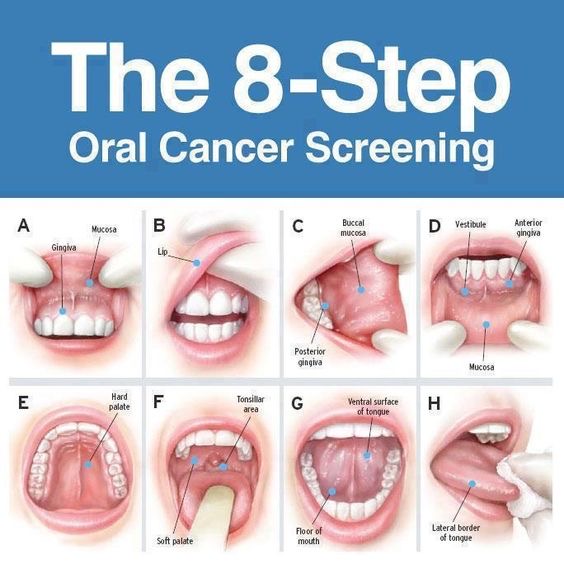When Should You Get Screened For Oral Cancer?

Oral cancer is a relatively common form of the disease, yet despite being a significant cause of death in the UK, especially among men, remains relatively obscure in terms of publicity and education.
The big question for many people is:
When Should I start screening for oral cancer?
Our broad answer would be to start at 18 years of age, regardless of lifestyle and regardless of tobacco use, or presence of symptoms.
In reality, however, it is never too early to start screening, especially given that early detection offers the most treatment options.
We would also recommend getting into the habit of self-checks from a young age, as this good habit will increase the chances of early detection.
What to Look out for: Signs and Symptoms
Signs of oral cancer include sores in the mouth that fail to heal, numbness, sore throats that fail to heal, white or red patches on gums, tongue, or mouth linings. Vague persistent pains in the mouth could also be a clue.
8 Step Oral Cancer Screening Process
There’s a number of potential problem areas to look out for when screening for oral cancer and this 8-step screening infographic walks you through them:

Self-checks should form part of your regular oral hygiene regimen, but not replace regular screenings by a professional. Additionally, if you spot something you’re unsure about, remember the motto:
‘If in doubt get checked out!’
The best way to receive screenings on a regular basis is by keeping regular dental appointments, where your dentist should perform your oral cancer check for you. Ideally you should be booking your checkups every six months, but annually as a minimum.
During your dental visit and professional cleaning, the dentist will examine your mouth for anything abnormal or unusual. You should make a point to tell your dentist about any signs and symptoms that you experience or see.
Lifestyle links to Oral Cancer
When discussing when to begin screening for oral cancer it is worth pointing out that whilst most cases occur in the over 40s, that around 91% of all diagnoses are linked to lifestyle.
This means young people can be vulnerable, but also that most people have a degree of control over managing the risks.
Lifestyle risks which can increase the chances of mouth cancer include:
* Tobacco
* Alcohol
* HPV
* Diet
* Chewing or Smokeless Tobacco
* Environmental
Tobacco and Alcohol
Tobacco and alcohol, in particular, are shown to demonstrate strong causal links when it comes to oral cancer, so we would always recommend regular screening for anyone that smokes, or consumes alcohol on a regular basis, irrespective of age.
Tobacco increases the risk of oral cancer, with 80% of sufferers having used some form of tobacco. All smokers and tobacco users should obtain regular oral cancer screenings as soon as they start using.
Given that around half of all tobacco users eventually die or incur disabilities as a result of tobacco use we would also recommend discussing approaches to quitting with your dentist.
Human papillomavirus (HPV)
HPV is a major cause of oral cancer and many commentators would probably argue it’s a lifestyle risk. Given its status as an epidemic, however, it could also be argued this risk sits in a category of its own. Check out our related article for a detailed introduction to some of the health considerations surrounding HPV:
HPV vaccination gap: Experts demand parity for Boys
Diet
Statistical data suggests that low fruit and vegetable consumption, often an indicator of high fat and/or sugar intake, increases the risk of oral cancer.
Environmental
The environment in which people live and work can influence the risks. For example, non-smokers that live or work in smoke-filled atmospheres are increasingly likely to be affected, despite their abstinence.
Free Consultation
To download a voucher for a consultation to discuss any of the issues covered; click below.
Free Consultation






